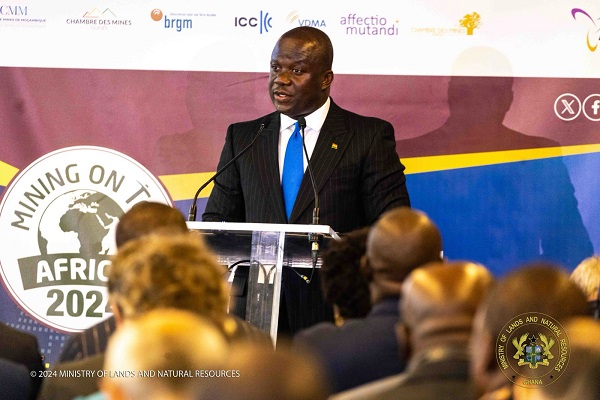Minister of Lands and Natural Resources, Samuel Abu Jinapour
Minister of Lands and Natural Resources, MP Samuel Abu Jinapor, particularly emphasised the need for mutually beneficial partnerships between African and European countries as African countries are now adopting more sustainable and environmentally friendly ways of utilizing their mineral resources.
The Lands Minister, who delivered a keynote address at the 2024 Mining On Top Africa conference in Paris, France, on Wednesday, July 3, 2024, expressed the urgent need to address the historical inequality that has existed between African mineral producing countries and developed countries, noting that a relationship that ensures the interests of both the West and Africa would be a step towards furthering the achievement of the United Nations’ sustainable development.
Samuel Abu Jinapor explained that mineral-producing countries are moving away from the outdated practice of “dig and ship” to new methods based on value addition and local participation.
He stressed the inclusive importance of partnerships rooted in the equitable sharing of benefits, as they will help African countries raise funds to play a central role in the fight against climate change.
“The United Nations Sustainable Development Goals (SDGs) provide a framework for addressing climate change, resource depletion and socio-economic inequalities that threaten the well-being of the global community. A mutually beneficial mining partnership between Europe and Africa is essential to achieving these 2030 targets. Our modern life depends heavily on mining and the appropriate use of various minerals,” he said.
“We must therefore take into account the profits generated through value addition and the ability to transform it into innovative products and related services to meet the needs of modern life. We must ensure that the framework for the extraction of these minerals generates benefits that are fairly distributed to all stakeholders, including the countries and communities that possess these minerals.”
“Through these partnerships, we can address environmental degradation, social conflict and economic inequality, while at the same time increasing efficiency and safety in mines. Our economic partnership agreements must therefore be designed to not only boost trade and investment, but also increase the value added of the minerals we extract, create job opportunities for economic growth and tackle poverty,” he said.
Ghana is among the African countries that have embarked on implementing environment-friendly policies in the mining sector and Abu Jinapor took the time to list out some of the initiatives and elaborate on their transformative impact.
“This clearly necessitates the implementation of mining-friendly policies that protect the interests of our people and investors while championing environmental sustainability. This is why Ghana, under the outstanding leadership of President Akufo-Addo, has adopted a Green Minerals Policy that seeks to promote value addition and beneficiation across the entire green minerals value chain and contribute significantly to the green energy transition.”
“Our aim is to keep the entire value chain of these critical minerals domestic as much as possible. We have already established, through a public-private partnership, a four hundred kilogram (400 kg) capacity gold refinery to refine the gold we produce.”
“We will also, through this policy, promote local content and local participation throughout the green minerals value chain, from exploration to extraction and downstream production, to ensure that Ghanaians, who are the owners of these minerals by our constitution, get the maximum benefit from them,” the Minister said.
The Minister also stressed the importance of fairness and inclusiveness in rewarding African countries committed to promoting the platform for the promotion of green mineral resources in their countries.
He pleaded with countries to adhere to the principles of the Paris Agreement, which requires countries to commit resources to fighting climate change.
“We must therefore use this opportunity to renew our commitment to tackling climate change through measures such as the transition to green energy, with mining playing a central role in its implementation.”
“But this transition must be fair, just, inclusive and inclusive. It should not be done in a way that benefits only the consumers of clean energy – the investors and their home countries. But it must be done in a way that benefits the end producers of the minerals needed for the transition, who have always suffered from a historical injustice commonly referred to as the ‘resource curse’. The balance, and the need for fairness, is crucial for sustainability and inclusive development,” he said.
The Mining On Top Africa Conference is a prestigious event that brings together ministers and prominent industry players from various African countries for a two-day summit focused on fostering partnerships between European and African countries for the sustainable exploration and development of mineral resources.
In a speech read on his behalf, Benjamin Gallezo, a French expert in the critical metals sector, stressed that sustainability and added value in mineral exploration are pressing issues that require urgent attention.
He expressed hope that partnership between African countries and Europe would enable Africa to significantly add value to its mineral resources and prioritise the energy transition in line with the Paris Agreement.
He believes that this cooperation will also be crucial in utilising mineral resources to promote sustainable development and mitigate climate change.


